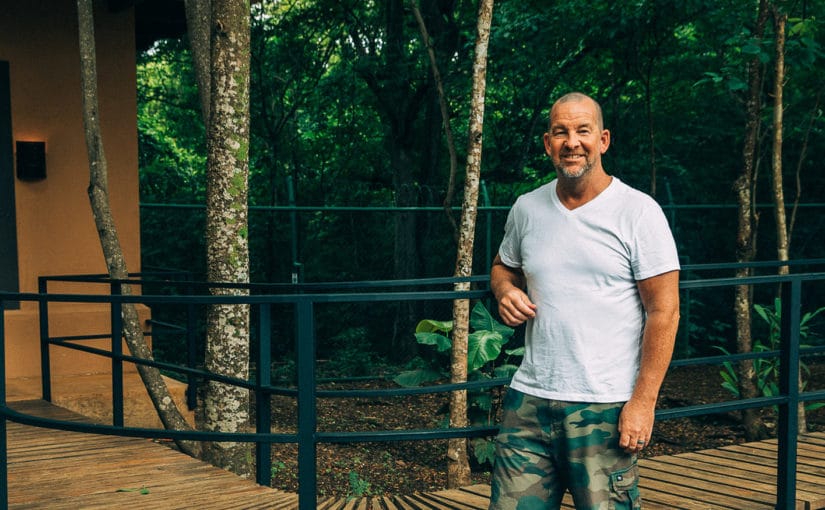[smart_track_player url=”http://traffic.libsyn.com/nionradio/163_-_Nion_Radio_-_Jeff_McNairy.mp3″ title=”How Plant Medicine Works In Your Brain” artist=”Dr. Jeff McNairy” image=”https://nionlife.com/wp-content/uploads/2019/08/NR-163_NIONradio_DrJeffMcNairy_CVR.jpg” color=”#de4b9b” ]
“Gerry wanted to have a place that was safe and had clinical people and shamans all together in one place, so that people that would never go to Peru or the jungle would actually come here.”
– Dr. Jeff McNairy
You all know that I’m very interested in the science behind things — if someone suggests that I try something — whether it be exercise, food, or medicine — and it doesn’t have science supporting its function, then I won’t try it.
I’ve recently been doing a podcast series on Rhythmia, a luxury resort and life advancement center, and the science behind plant medicines. I’ve had the pleasure of talking with the founder of Rhythmia himself, Gerry Powell, on the subject, and I learned so much from that interview. His whole life changed when he started studying plant medicine and how we can use it to heal subconscious trauma. It was a fascinating conversation, and it encouraged me to study the science behind plant medicine even more!
That’s why I have the chief medical officer of Rhythmia, Dr. Jeff McNairy, on ONKEN RADIO (formerly NION Radio) today to share his story about discovering plant medicine, how it can improve mental health, and how meditation and breathwork are essential parts of healing trauma.
Without further ado, let’s dive into our conversation.
Who Is Dr. Jeff McNairy?
Formerly the Head of Passages, a rehabilitation center for celebrities in Malibu, Dr. Jeff McNairy, PsyD., MPH, is now the Chief Medical Officer of Rhythmia, a life advancement center that is dedicated to helping people heal from trauma and experience spiritual enlightenment.
Since Dr. McNairy started working in the healthcare field 25 years ago, he has always felt like the standard Western treatments for trauma and depression weren’t the right answers. He has worked in a variety of medical environments and seen the struggles individuals have when actually trying to heal. The current Western system of healthcare is deficient in healing the population. It is more concerned with managing symptoms and using external sources for “change.”
But when Dr. McNairy started treating Gerry Powell at Passages, his journey took a completely different turn.
“He came into [Passages, and] he was wild … just a madman. I just started talking to him every day. … And we formed this bond. And after he left, I continued to see him, … [but] he was not getting any better. … He heard about this place in Costa Rica that did plant medicine, and he was suicidal at the time … [so] I said, ‘Dude, go for it because I don’t know what else to do.’… [But] the plant medicine was amazing, and the shaman was amazing. … He really needed [that] to turn this corner, and it changed his life.”
– Dr. Jeff McNairy
At first, Dr. McNairy was skeptical. He hadn’t studied plant medicine in the past, and it wasn’t something that was discussed in medical school. But the results were undeniable. Jerry, who had suffered from acute mental disorders and an addiction to Demerol, had cleared out his subconscious with the help of spiritual guidance and plant medicine and was doing better than ever.
“And so Gerry and I wanted to have a place that was safe and legal and medically licensed and has clinical people and also shamans … so altogether, one place so that people [who] would never go to Peru or the jungle would actually come [there].”
– Dr. Jeff McNairy
And thus, Rhythmia was born! Through Dr. McNairy’s intense experience with the most desperate patient populations (those who suffer from addiction, acute mental health disorders, and trauma), he has seen that the only real healing can come from within. Since he started his work with ayahuasca, Jeff has seen himself and others transformed by it and has endeavored to create a safe and certified space for people to learn from plant medicine and experience its many benefits.
Why Plant Medicine Is Revolutionary for Mental Health
I think it’s safe to say that right now in the world, we’re experiencing a mental health crisis. Rates of depression and anxiety have shot up the past couple of years, and the COVID-19 situation isn’t making anything easier. While the stigma of mental health is slowly fading away, the question still remains: Do we have the best treatment options for those suffering from mental illness?
“Some people have neurochemical imbalances, and some people have behavioral things going on that are upsetting to them. And sometimes, people have both of those, so they get diagnosed with major depressive disorder. And the protocol from the psychiatrists is to give them SSRI [medication], which are selective serotonin reuptake inhibitors, which are antidepressants. And what those do is they allow the serotonin … to stay just a split second longer in the synaptic cleft between the neurons in the brain before it gets absorbed. So when it sits there for a little bit, that enhances mood.”
– Dr. Jeff McNairy
While Dr. McNairy sees the benefit of antidepressants, he explained how they may not be the best treatment for mental health disorders. Rather than treating the root of the issue, they stabilize the problem so that it’s manageable. Often times, the root of mental health issues goes back to some underlying trauma that hasn’t been dealt with:
“The amygdala is the part of the brain that stores our subconscious memories and emotions. … Our emotions get shoved into the amygdala, and then they just stay there. And if there’s ongoing trauma or ongoing things that happen, there’s a pattern that develops where everything just gets pushed to the amygdala. And then now we’re not in trauma, and we’re trying to live our [lives] in a normal way. And those emotions start to creep out into our prefrontal cortex, which is like our consciousness.”
– Dr. Jeff McNairy
When you keep stuffing a laundry hamper with dirty clothes, it will eventually overflow. The same thing happens with negative emotions in our amygdalas. Sometimes, we’ll just be going throughout our day, and something will suddenly trigger us, and we’ll have no idea why. This can be confusing and even frightening because the emotions don’t seem relevant to what’s happening around you. While antidepressants can help control these responses, plant medicines, such as ayahuasca, can actually support breakthroughs:
“When you take ayahuasca, the amygdala opens up, and then the prefrontal cortex connects with the amygdala neurochemically, and you start to have these breakthroughs. … And then [with my patients,] I build a new neuron pathway through a concept called synaptic plasticity, which … the brain can adjust and grow and change based on what we do with our thoughts and our neurochemical environment. … The amygdala and the prefrontal cortex … are being reset and balanced through the ayahuasca.”
– Dr. Jeff McNairy
Through the use of plant medicines and synaptic plasticity, you can rewire your brain to no longer be afraid and traumatized by your past. Not only that, but plant medicines often work way faster than traditional Western medicine.
“My patients were so high risk that I didn’t have long to work with them, or else they were going to die, or they were just going to be miserable, OD, or commit suicide. … So that’s what I love about plant medicine. It’s fast, it’s quick, [and] it’s right to the point.”
– Dr. Jeff McNairy
Dr. McNairy gave an excellent metaphor that showed the difference between plant medicine and Western medicine. If you break your arm, you want to fix it and move on, right? You don’t want to have to dwell on your broken arm for the rest of your life. However, some people who struggle with mental illnesses are told they need to be in therapy groups for the rest of their lives. To be clear, antidepressants and therapy are not bad things — they’ve helped so many people — but wouldn’t you rather treat the problem and be done with it, rather than continue the process for years and years?
In my own experience with plant medicines, I see using them as subconscious surgery. They give you the power to go into your mind and work through things you didn’t even know were triggering you. Of course, I was interested to learn more about the science behind this type of shadow-work, and Dr. McNairy did not disappoint.
Shadow-Work from a Neurological Perspective
I want you to take a second and think about your story. Think about what has happened in your life — the good things and the bad. Almost everyone struggles with some element of their past, whether it be a mistake, abuse, or tragedy. Our impulse is usually to suppress the trauma rather than deal with it, but in order to heal, we must face those fears. We must do the necessary shadow-work to come out healed on the other side. Dr. McNairy gave this example to illustrate:
“Let’s say I was abused as a kid. … The emotions that are present during that time get put into the amygdala — fear, guilt, shame, anger, all kinds of stuff. … And then now I’m an adult, and I can’t have healthy relationships. I keep picking horrible partners. I’m upset. I’m angry. … Then I come and do plant medicine. Then I realize, ‘Oh, okay, well, I had a lot of trauma as a kid. I was abused.’… So your prefrontal cortex starts to try to make sense of those emotions. … But once you breathe into it and accept the fact that, ‘Hey, these emotions are from my past, [and] I need to feel them to get them out,’ [you can start to heal].”
– Dr. Jeff McNairy
Often to cope with trauma, people put on masks to hide themselves from the world. They manufacture an idea of how they want to be perceived, and they do their best to put that image into the world (trust me, we’ve all done it). But when we do this, we aren’t addressing the heart of the issue.
“The shadow-self is basically just the ego that has been created throughout our whole life to show the world what we want the world to see. And that’s not really who we are, right? It’s used to just protect us or to not get attention or to get attention. … So when you see who you’ve become on plant medicine, … you’re basically seeing what you’ve created in your ego and what that person is like.”
– Dr. Jeff McNairy
Dr. McNairy calls this process “reorganizing the ego,” which is basically a merging of the authentic higher self with the ego. You become more plugged into who you are, and you understand yourself on a deeper level through this process. Not only that, but you also experience healing as a result. Dr. McNairy has seen it happen time and time again over at Rhythmia:
“Some of the ones that really stand out are people [who] have a history of depression … and they have a history of meds, and they came off the meds … and process all of this stuff that they never looked at before. … Their concern while they’re here is, ‘Oh, I don’t want to go back to my meds. I don’t want to go back to this [or] that.’ I say, ‘Give it some time, get home, transition, adjust back to your life, and see how you feel. And most people [who] come through never go back to their meds, and they feel amazing.”
– Dr. Jeff McNairy
Some guests at Rhythmia even report that their auto-immune disorder symptoms decrease or disappear entirely. You can read all sorts of testimonials on the Rhythmia website if you want to hear more stories about how plant medicines are changing lives for the better.
The Science Behind Breathwork
In combination with using plant medicines, breathwork and meditation are excellent ways to supplement your experience. You can also use these tools apart from plant medicines — they are available to you 24/7. We just often forget to use them.
“Breathing and oxygen obviously are essential, right? Obviously, most people don’t breathe very deeply. And when they actually focus on their breath, a lot can happen. And sometimes, people breathe shallow for emotional reasons — not because they’re lazy or overweight. It’s just because they don’t want to go deep. It’s very symbolic.”
– Dr. Jeff McNairy
Think about your breath for a minute. Do you tend to take deep, slow breaths or quick, shallow ones? If you take shallow breaths, it’s not always due to your physique — sometimes, it can be an indicator of unprocessed trauma or suppressed anxiety. When you take the time to intentionally take deep breaths, you start to rewire your brain chemistry.
“When you have a full oxygen content in your body, things get shifted in there, too, because you’re … adjusting the pH of your body by having a high level of oxygen. And then with the CO2 that’s being released on the exhale, there’s all this neurochemical stuff that happens during that, and also related to the oxygen and the hemoglobin sort of binding. And so what happens when you do breathwork is [that] you’re giving yourself a super huge charge of oxygen, but then you’re also mindfully thinking of certain stuff that’s connecting you to your body.”
– Dr. Jeff McNairy
When you breathe deeply, you saturate your body with oxygen, and when you pair that with mediation, you’ll find yourself in a peaceful space where you’re totally plugged into your body. During this time, you can work on visualizing your desires, releasing tension, and being grateful for your body.
Breathwork is a huge aspect of Rhythmia’s practices, and when paired with plant medicine, people are able to receive so much clarity about their subconscious mind. Of course, you don’t have to use plant medicines to reap the benefits of breathwork and meditation. These are tools that are available to you right now.
Have you ever tried meditation or breathing exercises? If not, I strongly encourage you to carve out some time to sit still, take deep breaths, and focus on what your body is telling you. It’s becoming clearer and clearer that these practices scientifically improve our minds and bodies.
Be a Creative Alchemist with Dr. Jeff McNairy
Alchemy is defined as the process of taking something ordinary and turning it into something extraordinary, sometimes in a way that cannot be explained.
With that being said, I define Creative Alchemy as using the process of creativity to create a lens through which to perform alchemy. These principles not only apply to artists and creatives in their own creative processes, but to anyone who wants to create an extraordinary life in color for themselves.
I’ve found that 80% of creating is alchemizing the thoughts, emotions, and other inner blocks that keep you from putting the pen to the paper. Navigating to the act of creation takes alchemical processes. Dr. Jeff McNairy is doing extraordinary work in this field — he’s helping people who’ve suffered immense trauma and addiction break free from their binds and start living happy lives, all through the use of plant medicine.
If you’re considering trying plant medicine, first understand that you have to do it under very controlled conditions and with the right intentions. Definitely educate yourself before you try anything. Michael Pollan’s book, How to Change Your Mind, is a great place to start. It will give you great historical context along with scientific studies on how to approach plant medicines. Also, it’s a good idea to work with a professional, such as the specialists at Rhythmia, so that your journey will be guided in the best way possible.
If you want to hear more from Dr. McNairy about the science behind plant medicine, definitely check out Rhytmia’s Facebook page. Every Monday night at 6:00 Pacific Time, Dr. McNairy goes on Facebook Live to talk about everything plant medicine and psychology. I know that I, for one, will definitely be tuning in.
If you enjoyed the interview, we’d love to hear from you. Tag Dr. McNairy, @rhytmia, and me, @nickonken, on Instagram with a screenshot of the episode and share your greatest takeaways. And if you love this podcast and want to support me, please subscribe and leave a good review on Apple Podcasts. Every review helps.
Thanks so much for reading. I’ll leave you with this: My mission is to help you become the better version of yourself by creating in every small moment. To do that effectively, we often have to heal from past trauma to overcome subconscious blocks. In whatever modality you choose, I hope the best for you and am here to support you along the way.
Until next time —
Nick Onken
“The shadow self is basically just the ego that has been created throughout our whole life to show the world what we want the world to see.”
– Dr. Jeff McNairy
You can Subscribe and Listen to the Podcast on Apple Podcasts. And please leave me a Rating and Review!
Some things we learn in this podcast:
- How Jeff moved from working at a rehab center to working with Gerry at Rythmia [4:15]
- How people with medications have to prepare for taking ayahuasca [12:35]
- What is happening in your brain when you take plant medicine [15:44]
- How Jeff helps people who are extremely depressed move towards working with plant medicine [21:22]
- What our shadow-sides look like from a neuroscience perspective [22:33]
- The transformations that Jeff has seen at Rythmia [26:38]
- How breathwork affects us in a similar way to ayahuasca [33:39]
- The difference of experiences between psilocybin and ayahuasca [38:14]
- Jeff’s experiences taking care of his own traumas through ayahuasca [40:08]
- What the higher self looks like in the brain [43:59]
- Why some people go back to their old triggers and lifestyles after taking ayahuasca [46:50]
- How exercise helps people keep a healthy emotional and mental state [51:51]
Links Mentioned:
LET'S CONSPIRE & CREATE
CULTIVATING YOUR VISUAL UNIQUENESS AND STREAMLINING YOUR BRAND'S EVOLUTION
[smart_track_player url=”http://traffic.libsyn.com/nionradio/163_-_Nion_Radio_-_Jeff_McNairy.mp3″ title=”How Plant Medicine Works In Your Brain” artist=”Dr. Jeff McNairy” image=”https://nionlife.com/wp-content/uploads/2019/08/NR-163_NIONradio_DrJeffMcNairy_CVR.jpg” color=”#de4b9b” ]
“Gerry wanted to have a place that was safe and had clinical people and shamans all together in one place, so that people that would never go to Peru or the jungle would actually come here.”
– Dr. Jeff McNairy
You all know that I’m very interested in the science behind things — if someone suggests that I try something — whether it be exercise, food, or medicine — and it doesn’t have science supporting its function, then I won’t try it.
I’ve recently been doing a podcast series on Rhythmia, a luxury resort and life advancement center, and the science behind plant medicines. I’ve had the pleasure of talking with the founder of Rhythmia himself, Gerry Powell, on the subject, and I learned so much from that interview. His whole life changed when he started studying plant medicine and how we can use it to heal subconscious trauma. It was a fascinating conversation, and it encouraged me to study the science behind plant medicine even more!
That’s why I have the chief medical officer of Rhythmia, Dr. Jeff McNairy, on ONKEN RADIO (formerly NION Radio) today to share his story about discovering plant medicine, how it can improve mental health, and how meditation and breathwork are essential parts of healing trauma.
Without further ado, let’s dive into our conversation.
Who Is Dr. Jeff McNairy?
Formerly the Head of Passages, a rehabilitation center for celebrities in Malibu, Dr. Jeff McNairy, PsyD., MPH, is now the Chief Medical Officer of Rhythmia, a life advancement center that is dedicated to helping people heal from trauma and experience spiritual enlightenment.
Since Dr. McNairy started working in the healthcare field 25 years ago, he has always felt like the standard Western treatments for trauma and depression weren’t the right answers. He has worked in a variety of medical environments and seen the struggles individuals have when actually trying to heal. The current Western system of healthcare is deficient in healing the population. It is more concerned with managing symptoms and using external sources for “change.”
But when Dr. McNairy started treating Gerry Powell at Passages, his journey took a completely different turn.
“He came into [Passages, and] he was wild … just a madman. I just started talking to him every day. … And we formed this bond. And after he left, I continued to see him, … [but] he was not getting any better. … He heard about this place in Costa Rica that did plant medicine, and he was suicidal at the time … [so] I said, ‘Dude, go for it because I don’t know what else to do.’… [But] the plant medicine was amazing, and the shaman was amazing. … He really needed [that] to turn this corner, and it changed his life.”
– Dr. Jeff McNairy
At first, Dr. McNairy was skeptical. He hadn’t studied plant medicine in the past, and it wasn’t something that was discussed in medical school. But the results were undeniable. Jerry, who had suffered from acute mental disorders and an addiction to Demerol, had cleared out his subconscious with the help of spiritual guidance and plant medicine and was doing better than ever.
“And so Gerry and I wanted to have a place that was safe and legal and medically licensed and has clinical people and also shamans … so altogether, one place so that people [who] would never go to Peru or the jungle would actually come [there].”
– Dr. Jeff McNairy
And thus, Rhythmia was born! Through Dr. McNairy’s intense experience with the most desperate patient populations (those who suffer from addiction, acute mental health disorders, and trauma), he has seen that the only real healing can come from within. Since he started his work with ayahuasca, Jeff has seen himself and others transformed by it and has endeavored to create a safe and certified space for people to learn from plant medicine and experience its many benefits.
Why Plant Medicine Is Revolutionary for Mental Health
I think it’s safe to say that right now in the world, we’re experiencing a mental health crisis. Rates of depression and anxiety have shot up the past couple of years, and the COVID-19 situation isn’t making anything easier. While the stigma of mental health is slowly fading away, the question still remains: Do we have the best treatment options for those suffering from mental illness?
“Some people have neurochemical imbalances, and some people have behavioral things going on that are upsetting to them. And sometimes, people have both of those, so they get diagnosed with major depressive disorder. And the protocol from the psychiatrists is to give them SSRI [medication], which are selective serotonin reuptake inhibitors, which are antidepressants. And what those do is they allow the serotonin … to stay just a split second longer in the synaptic cleft between the neurons in the brain before it gets absorbed. So when it sits there for a little bit, that enhances mood.”
– Dr. Jeff McNairy
While Dr. McNairy sees the benefit of antidepressants, he explained how they may not be the best treatment for mental health disorders. Rather than treating the root of the issue, they stabilize the problem so that it’s manageable. Often times, the root of mental health issues goes back to some underlying trauma that hasn’t been dealt with:
“The amygdala is the part of the brain that stores our subconscious memories and emotions. … Our emotions get shoved into the amygdala, and then they just stay there. And if there’s ongoing trauma or ongoing things that happen, there’s a pattern that develops where everything just gets pushed to the amygdala. And then now we’re not in trauma, and we’re trying to live our [lives] in a normal way. And those emotions start to creep out into our prefrontal cortex, which is like our consciousness.”
– Dr. Jeff McNairy
When you keep stuffing a laundry hamper with dirty clothes, it will eventually overflow. The same thing happens with negative emotions in our amygdalas. Sometimes, we’ll just be going throughout our day, and something will suddenly trigger us, and we’ll have no idea why. This can be confusing and even frightening because the emotions don’t seem relevant to what’s happening around you. While antidepressants can help control these responses, plant medicines, such as ayahuasca, can actually support breakthroughs:
“When you take ayahuasca, the amygdala opens up, and then the prefrontal cortex connects with the amygdala neurochemically, and you start to have these breakthroughs. … And then [with my patients,] I build a new neuron pathway through a concept called synaptic plasticity, which … the brain can adjust and grow and change based on what we do with our thoughts and our neurochemical environment. … The amygdala and the prefrontal cortex … are being reset and balanced through the ayahuasca.”
– Dr. Jeff McNairy
Through the use of plant medicines and synaptic plasticity, you can rewire your brain to no longer be afraid and traumatized by your past. Not only that, but plant medicines often work way faster than traditional Western medicine.
“My patients were so high risk that I didn’t have long to work with them, or else they were going to die, or they were just going to be miserable, OD, or commit suicide. … So that’s what I love about plant medicine. It’s fast, it’s quick, [and] it’s right to the point.”
– Dr. Jeff McNairy
Dr. McNairy gave an excellent metaphor that showed the difference between plant medicine and Western medicine. If you break your arm, you want to fix it and move on, right? You don’t want to have to dwell on your broken arm for the rest of your life. However, some people who struggle with mental illnesses are told they need to be in therapy groups for the rest of their lives. To be clear, antidepressants and therapy are not bad things — they’ve helped so many people — but wouldn’t you rather treat the problem and be done with it, rather than continue the process for years and years?
In my own experience with plant medicines, I see using them as subconscious surgery. They give you the power to go into your mind and work through things you didn’t even know were triggering you. Of course, I was interested to learn more about the science behind this type of shadow-work, and Dr. McNairy did not disappoint.
Shadow-Work from a Neurological Perspective
I want you to take a second and think about your story. Think about what has happened in your life — the good things and the bad. Almost everyone struggles with some element of their past, whether it be a mistake, abuse, or tragedy. Our impulse is usually to suppress the trauma rather than deal with it, but in order to heal, we must face those fears. We must do the necessary shadow-work to come out healed on the other side. Dr. McNairy gave this example to illustrate:
“Let’s say I was abused as a kid. … The emotions that are present during that time get put into the amygdala — fear, guilt, shame, anger, all kinds of stuff. … And then now I’m an adult, and I can’t have healthy relationships. I keep picking horrible partners. I’m upset. I’m angry. … Then I come and do plant medicine. Then I realize, ‘Oh, okay, well, I had a lot of trauma as a kid. I was abused.’… So your prefrontal cortex starts to try to make sense of those emotions. … But once you breathe into it and accept the fact that, ‘Hey, these emotions are from my past, [and] I need to feel them to get them out,’ [you can start to heal].”
– Dr. Jeff McNairy
Often to cope with trauma, people put on masks to hide themselves from the world. They manufacture an idea of how they want to be perceived, and they do their best to put that image into the world (trust me, we’ve all done it). But when we do this, we aren’t addressing the heart of the issue.
“The shadow-self is basically just the ego that has been created throughout our whole life to show the world what we want the world to see. And that’s not really who we are, right? It’s used to just protect us or to not get attention or to get attention. … So when you see who you’ve become on plant medicine, … you’re basically seeing what you’ve created in your ego and what that person is like.”
– Dr. Jeff McNairy
Dr. McNairy calls this process “reorganizing the ego,” which is basically a merging of the authentic higher self with the ego. You become more plugged into who you are, and you understand yourself on a deeper level through this process. Not only that, but you also experience healing as a result. Dr. McNairy has seen it happen time and time again over at Rhythmia:
“Some of the ones that really stand out are people [who] have a history of depression … and they have a history of meds, and they came off the meds … and process all of this stuff that they never looked at before. … Their concern while they’re here is, ‘Oh, I don’t want to go back to my meds. I don’t want to go back to this [or] that.’ I say, ‘Give it some time, get home, transition, adjust back to your life, and see how you feel. And most people [who] come through never go back to their meds, and they feel amazing.”
– Dr. Jeff McNairy
Some guests at Rhythmia even report that their auto-immune disorder symptoms decrease or disappear entirely. You can read all sorts of testimonials on the Rhythmia website if you want to hear more stories about how plant medicines are changing lives for the better.
The Science Behind Breathwork
In combination with using plant medicines, breathwork and meditation are excellent ways to supplement your experience. You can also use these tools apart from plant medicines — they are available to you 24/7. We just often forget to use them.
“Breathing and oxygen obviously are essential, right? Obviously, most people don’t breathe very deeply. And when they actually focus on their breath, a lot can happen. And sometimes, people breathe shallow for emotional reasons — not because they’re lazy or overweight. It’s just because they don’t want to go deep. It’s very symbolic.”
– Dr. Jeff McNairy
Think about your breath for a minute. Do you tend to take deep, slow breaths or quick, shallow ones? If you take shallow breaths, it’s not always due to your physique — sometimes, it can be an indicator of unprocessed trauma or suppressed anxiety. When you take the time to intentionally take deep breaths, you start to rewire your brain chemistry.
“When you have a full oxygen content in your body, things get shifted in there, too, because you’re … adjusting the pH of your body by having a high level of oxygen. And then with the CO2 that’s being released on the exhale, there’s all this neurochemical stuff that happens during that, and also related to the oxygen and the hemoglobin sort of binding. And so what happens when you do breathwork is [that] you’re giving yourself a super huge charge of oxygen, but then you’re also mindfully thinking of certain stuff that’s connecting you to your body.”
– Dr. Jeff McNairy
When you breathe deeply, you saturate your body with oxygen, and when you pair that with mediation, you’ll find yourself in a peaceful space where you’re totally plugged into your body. During this time, you can work on visualizing your desires, releasing tension, and being grateful for your body.
Breathwork is a huge aspect of Rhythmia’s practices, and when paired with plant medicine, people are able to receive so much clarity about their subconscious mind. Of course, you don’t have to use plant medicines to reap the benefits of breathwork and meditation. These are tools that are available to you right now.
Have you ever tried meditation or breathing exercises? If not, I strongly encourage you to carve out some time to sit still, take deep breaths, and focus on what your body is telling you. It’s becoming clearer and clearer that these practices scientifically improve our minds and bodies.
Be a Creative Alchemist with Dr. Jeff McNairy
Alchemy is defined as the process of taking something ordinary and turning it into something extraordinary, sometimes in a way that cannot be explained.
With that being said, I define Creative Alchemy as using the process of creativity to create a lens through which to perform alchemy. These principles not only apply to artists and creatives in their own creative processes, but to anyone who wants to create an extraordinary life in color for themselves.
I’ve found that 80% of creating is alchemizing the thoughts, emotions, and other inner blocks that keep you from putting the pen to the paper. Navigating to the act of creation takes alchemical processes. Dr. Jeff McNairy is doing extraordinary work in this field — he’s helping people who’ve suffered immense trauma and addiction break free from their binds and start living happy lives, all through the use of plant medicine.
If you’re considering trying plant medicine, first understand that you have to do it under very controlled conditions and with the right intentions. Definitely educate yourself before you try anything. Michael Pollan’s book, How to Change Your Mind, is a great place to start. It will give you great historical context along with scientific studies on how to approach plant medicines. Also, it’s a good idea to work with a professional, such as the specialists at Rhythmia, so that your journey will be guided in the best way possible.
If you want to hear more from Dr. McNairy about the science behind plant medicine, definitely check out Rhytmia’s Facebook page. Every Monday night at 6:00 Pacific Time, Dr. McNairy goes on Facebook Live to talk about everything plant medicine and psychology. I know that I, for one, will definitely be tuning in.
If you enjoyed the interview, we’d love to hear from you. Tag Dr. McNairy, @rhytmia, and me, @nickonken, on Instagram with a screenshot of the episode and share your greatest takeaways. And if you love this podcast and want to support me, please subscribe and leave a good review on Apple Podcasts. Every review helps.
Thanks so much for reading. I’ll leave you with this: My mission is to help you become the better version of yourself by creating in every small moment. To do that effectively, we often have to heal from past trauma to overcome subconscious blocks. In whatever modality you choose, I hope the best for you and am here to support you along the way.
Until next time —
Nick Onken
“The shadow self is basically just the ego that has been created throughout our whole life to show the world what we want the world to see.”
– Dr. Jeff McNairy
You can Subscribe and Listen to the Podcast on Apple Podcasts. And please leave me a Rating and Review!
Some things we learn in this podcast:
- How Jeff moved from working at a rehab center to working with Gerry at Rythmia [4:15]
- How people with medications have to prepare for taking ayahuasca [12:35]
- What is happening in your brain when you take plant medicine [15:44]
- How Jeff helps people who are extremely depressed move towards working with plant medicine [21:22]
- What our shadow-sides look like from a neuroscience perspective [22:33]
- The transformations that Jeff has seen at Rythmia [26:38]
- How breathwork affects us in a similar way to ayahuasca [33:39]
- The difference of experiences between psilocybin and ayahuasca [38:14]
- Jeff’s experiences taking care of his own traumas through ayahuasca [40:08]
- What the higher self looks like in the brain [43:59]
- Why some people go back to their old triggers and lifestyles after taking ayahuasca [46:50]
- How exercise helps people keep a healthy emotional and mental state [51:51]
Links Mentioned:

8/27/19
163: Dr. Jeff McNairy – How Plant Medicine Works In Your Brain
infuse your vision with a fresh breath of creativity and vitality
BOOK A BRAND PHOTOSHOOT
GET THE DETAILS
GET THE DETAILS
infuse your vision with a fresh breath of creativity and vitality
PODCAST
BRAND INTELLIGENCE
CREATIVE INTELLIGENCE
LIFE INTELLIGENCE

masterfully aligning perception and reality through personal branding



masterfully aligning perception and reality through personal branding


[smart_track_player url=”http://traffic.libsyn.com/nionradio/163_-_Nion_Radio_-_Jeff_McNairy.mp3″ title=”How Plant Medicine Works In Your Brain” artist=”Dr. Jeff McNairy” image=”https://nionlife.com/wp-content/uploads/2019/08/NR-163_NIONradio_DrJeffMcNairy_CVR.jpg” color=”#de4b9b” ]
“Gerry wanted to have a place that was safe and had clinical people and shamans all together in one place, so that people that would never go to Peru or the jungle would actually come here.”
– Dr. Jeff McNairy
You all know that I’m very interested in the science behind things — if someone suggests that I try something — whether it be exercise, food, or medicine — and it doesn’t have science supporting its function, then I won’t try it.
I’ve recently been doing a podcast series on Rhythmia, a luxury resort and life advancement center, and the science behind plant medicines. I’ve had the pleasure of talking with the founder of Rhythmia himself, Gerry Powell, on the subject, and I learned so much from that interview. His whole life changed when he started studying plant medicine and how we can use it to heal subconscious trauma. It was a fascinating conversation, and it encouraged me to study the science behind plant medicine even more!
That’s why I have the chief medical officer of Rhythmia, Dr. Jeff McNairy, on ONKEN RADIO (formerly NION Radio) today to share his story about discovering plant medicine, how it can improve mental health, and how meditation and breathwork are essential parts of healing trauma.
Without further ado, let’s dive into our conversation.
Who Is Dr. Jeff McNairy?
Formerly the Head of Passages, a rehabilitation center for celebrities in Malibu, Dr. Jeff McNairy, PsyD., MPH, is now the Chief Medical Officer of Rhythmia, a life advancement center that is dedicated to helping people heal from trauma and experience spiritual enlightenment.
Since Dr. McNairy started working in the healthcare field 25 years ago, he has always felt like the standard Western treatments for trauma and depression weren’t the right answers. He has worked in a variety of medical environments and seen the struggles individuals have when actually trying to heal. The current Western system of healthcare is deficient in healing the population. It is more concerned with managing symptoms and using external sources for “change.”
But when Dr. McNairy started treating Gerry Powell at Passages, his journey took a completely different turn.
“He came into [Passages, and] he was wild … just a madman. I just started talking to him every day. … And we formed this bond. And after he left, I continued to see him, … [but] he was not getting any better. … He heard about this place in Costa Rica that did plant medicine, and he was suicidal at the time … [so] I said, ‘Dude, go for it because I don’t know what else to do.’… [But] the plant medicine was amazing, and the shaman was amazing. … He really needed [that] to turn this corner, and it changed his life.”
– Dr. Jeff McNairy
At first, Dr. McNairy was skeptical. He hadn’t studied plant medicine in the past, and it wasn’t something that was discussed in medical school. But the results were undeniable. Jerry, who had suffered from acute mental disorders and an addiction to Demerol, had cleared out his subconscious with the help of spiritual guidance and plant medicine and was doing better than ever.
“And so Gerry and I wanted to have a place that was safe and legal and medically licensed and has clinical people and also shamans … so altogether, one place so that people [who] would never go to Peru or the jungle would actually come [there].”
– Dr. Jeff McNairy
And thus, Rhythmia was born! Through Dr. McNairy’s intense experience with the most desperate patient populations (those who suffer from addiction, acute mental health disorders, and trauma), he has seen that the only real healing can come from within. Since he started his work with ayahuasca, Jeff has seen himself and others transformed by it and has endeavored to create a safe and certified space for people to learn from plant medicine and experience its many benefits.
Why Plant Medicine Is Revolutionary for Mental Health
I think it’s safe to say that right now in the world, we’re experiencing a mental health crisis. Rates of depression and anxiety have shot up the past couple of years, and the COVID-19 situation isn’t making anything easier. While the stigma of mental health is slowly fading away, the question still remains: Do we have the best treatment options for those suffering from mental illness?
“Some people have neurochemical imbalances, and some people have behavioral things going on that are upsetting to them. And sometimes, people have both of those, so they get diagnosed with major depressive disorder. And the protocol from the psychiatrists is to give them SSRI [medication], which are selective serotonin reuptake inhibitors, which are antidepressants. And what those do is they allow the serotonin … to stay just a split second longer in the synaptic cleft between the neurons in the brain before it gets absorbed. So when it sits there for a little bit, that enhances mood.”
– Dr. Jeff McNairy
While Dr. McNairy sees the benefit of antidepressants, he explained how they may not be the best treatment for mental health disorders. Rather than treating the root of the issue, they stabilize the problem so that it’s manageable. Often times, the root of mental health issues goes back to some underlying trauma that hasn’t been dealt with:
“The amygdala is the part of the brain that stores our subconscious memories and emotions. … Our emotions get shoved into the amygdala, and then they just stay there. And if there’s ongoing trauma or ongoing things that happen, there’s a pattern that develops where everything just gets pushed to the amygdala. And then now we’re not in trauma, and we’re trying to live our [lives] in a normal way. And those emotions start to creep out into our prefrontal cortex, which is like our consciousness.”
– Dr. Jeff McNairy
When you keep stuffing a laundry hamper with dirty clothes, it will eventually overflow. The same thing happens with negative emotions in our amygdalas. Sometimes, we’ll just be going throughout our day, and something will suddenly trigger us, and we’ll have no idea why. This can be confusing and even frightening because the emotions don’t seem relevant to what’s happening around you. While antidepressants can help control these responses, plant medicines, such as ayahuasca, can actually support breakthroughs:
“When you take ayahuasca, the amygdala opens up, and then the prefrontal cortex connects with the amygdala neurochemically, and you start to have these breakthroughs. … And then [with my patients,] I build a new neuron pathway through a concept called synaptic plasticity, which … the brain can adjust and grow and change based on what we do with our thoughts and our neurochemical environment. … The amygdala and the prefrontal cortex … are being reset and balanced through the ayahuasca.”
– Dr. Jeff McNairy
Through the use of plant medicines and synaptic plasticity, you can rewire your brain to no longer be afraid and traumatized by your past. Not only that, but plant medicines often work way faster than traditional Western medicine.
“My patients were so high risk that I didn’t have long to work with them, or else they were going to die, or they were just going to be miserable, OD, or commit suicide. … So that’s what I love about plant medicine. It’s fast, it’s quick, [and] it’s right to the point.”
– Dr. Jeff McNairy
Dr. McNairy gave an excellent metaphor that showed the difference between plant medicine and Western medicine. If you break your arm, you want to fix it and move on, right? You don’t want to have to dwell on your broken arm for the rest of your life. However, some people who struggle with mental illnesses are told they need to be in therapy groups for the rest of their lives. To be clear, antidepressants and therapy are not bad things — they’ve helped so many people — but wouldn’t you rather treat the problem and be done with it, rather than continue the process for years and years?
In my own experience with plant medicines, I see using them as subconscious surgery. They give you the power to go into your mind and work through things you didn’t even know were triggering you. Of course, I was interested to learn more about the science behind this type of shadow-work, and Dr. McNairy did not disappoint.
Shadow-Work from a Neurological Perspective
I want you to take a second and think about your story. Think about what has happened in your life — the good things and the bad. Almost everyone struggles with some element of their past, whether it be a mistake, abuse, or tragedy. Our impulse is usually to suppress the trauma rather than deal with it, but in order to heal, we must face those fears. We must do the necessary shadow-work to come out healed on the other side. Dr. McNairy gave this example to illustrate:
“Let’s say I was abused as a kid. … The emotions that are present during that time get put into the amygdala — fear, guilt, shame, anger, all kinds of stuff. … And then now I’m an adult, and I can’t have healthy relationships. I keep picking horrible partners. I’m upset. I’m angry. … Then I come and do plant medicine. Then I realize, ‘Oh, okay, well, I had a lot of trauma as a kid. I was abused.’… So your prefrontal cortex starts to try to make sense of those emotions. … But once you breathe into it and accept the fact that, ‘Hey, these emotions are from my past, [and] I need to feel them to get them out,’ [you can start to heal].”
– Dr. Jeff McNairy
Often to cope with trauma, people put on masks to hide themselves from the world. They manufacture an idea of how they want to be perceived, and they do their best to put that image into the world (trust me, we’ve all done it). But when we do this, we aren’t addressing the heart of the issue.
“The shadow-self is basically just the ego that has been created throughout our whole life to show the world what we want the world to see. And that’s not really who we are, right? It’s used to just protect us or to not get attention or to get attention. … So when you see who you’ve become on plant medicine, … you’re basically seeing what you’ve created in your ego and what that person is like.”
– Dr. Jeff McNairy
Dr. McNairy calls this process “reorganizing the ego,” which is basically a merging of the authentic higher self with the ego. You become more plugged into who you are, and you understand yourself on a deeper level through this process. Not only that, but you also experience healing as a result. Dr. McNairy has seen it happen time and time again over at Rhythmia:
“Some of the ones that really stand out are people [who] have a history of depression … and they have a history of meds, and they came off the meds … and process all of this stuff that they never looked at before. … Their concern while they’re here is, ‘Oh, I don’t want to go back to my meds. I don’t want to go back to this [or] that.’ I say, ‘Give it some time, get home, transition, adjust back to your life, and see how you feel. And most people [who] come through never go back to their meds, and they feel amazing.”
– Dr. Jeff McNairy
Some guests at Rhythmia even report that their auto-immune disorder symptoms decrease or disappear entirely. You can read all sorts of testimonials on the Rhythmia website if you want to hear more stories about how plant medicines are changing lives for the better.
The Science Behind Breathwork
In combination with using plant medicines, breathwork and meditation are excellent ways to supplement your experience. You can also use these tools apart from plant medicines — they are available to you 24/7. We just often forget to use them.
“Breathing and oxygen obviously are essential, right? Obviously, most people don’t breathe very deeply. And when they actually focus on their breath, a lot can happen. And sometimes, people breathe shallow for emotional reasons — not because they’re lazy or overweight. It’s just because they don’t want to go deep. It’s very symbolic.”
– Dr. Jeff McNairy
Think about your breath for a minute. Do you tend to take deep, slow breaths or quick, shallow ones? If you take shallow breaths, it’s not always due to your physique — sometimes, it can be an indicator of unprocessed trauma or suppressed anxiety. When you take the time to intentionally take deep breaths, you start to rewire your brain chemistry.
“When you have a full oxygen content in your body, things get shifted in there, too, because you’re … adjusting the pH of your body by having a high level of oxygen. And then with the CO2 that’s being released on the exhale, there’s all this neurochemical stuff that happens during that, and also related to the oxygen and the hemoglobin sort of binding. And so what happens when you do breathwork is [that] you’re giving yourself a super huge charge of oxygen, but then you’re also mindfully thinking of certain stuff that’s connecting you to your body.”
– Dr. Jeff McNairy
When you breathe deeply, you saturate your body with oxygen, and when you pair that with mediation, you’ll find yourself in a peaceful space where you’re totally plugged into your body. During this time, you can work on visualizing your desires, releasing tension, and being grateful for your body.
Breathwork is a huge aspect of Rhythmia’s practices, and when paired with plant medicine, people are able to receive so much clarity about their subconscious mind. Of course, you don’t have to use plant medicines to reap the benefits of breathwork and meditation. These are tools that are available to you right now.
Have you ever tried meditation or breathing exercises? If not, I strongly encourage you to carve out some time to sit still, take deep breaths, and focus on what your body is telling you. It’s becoming clearer and clearer that these practices scientifically improve our minds and bodies.
Be a Creative Alchemist with Dr. Jeff McNairy
Alchemy is defined as the process of taking something ordinary and turning it into something extraordinary, sometimes in a way that cannot be explained.
With that being said, I define Creative Alchemy as using the process of creativity to create a lens through which to perform alchemy. These principles not only apply to artists and creatives in their own creative processes, but to anyone who wants to create an extraordinary life in color for themselves.
I’ve found that 80% of creating is alchemizing the thoughts, emotions, and other inner blocks that keep you from putting the pen to the paper. Navigating to the act of creation takes alchemical processes. Dr. Jeff McNairy is doing extraordinary work in this field — he’s helping people who’ve suffered immense trauma and addiction break free from their binds and start living happy lives, all through the use of plant medicine.
If you’re considering trying plant medicine, first understand that you have to do it under very controlled conditions and with the right intentions. Definitely educate yourself before you try anything. Michael Pollan’s book, How to Change Your Mind, is a great place to start. It will give you great historical context along with scientific studies on how to approach plant medicines. Also, it’s a good idea to work with a professional, such as the specialists at Rhythmia, so that your journey will be guided in the best way possible.
If you want to hear more from Dr. McNairy about the science behind plant medicine, definitely check out Rhytmia’s Facebook page. Every Monday night at 6:00 Pacific Time, Dr. McNairy goes on Facebook Live to talk about everything plant medicine and psychology. I know that I, for one, will definitely be tuning in.
If you enjoyed the interview, we’d love to hear from you. Tag Dr. McNairy, @rhytmia, and me, @nickonken, on Instagram with a screenshot of the episode and share your greatest takeaways. And if you love this podcast and want to support me, please subscribe and leave a good review on Apple Podcasts. Every review helps.
Thanks so much for reading. I’ll leave you with this: My mission is to help you become the better version of yourself by creating in every small moment. To do that effectively, we often have to heal from past trauma to overcome subconscious blocks. In whatever modality you choose, I hope the best for you and am here to support you along the way.
Until next time —
Nick Onken
“The shadow self is basically just the ego that has been created throughout our whole life to show the world what we want the world to see.”
– Dr. Jeff McNairy
You can Subscribe and Listen to the Podcast on Apple Podcasts. And please leave me a Rating and Review!
Some things we learn in this podcast:
- How Jeff moved from working at a rehab center to working with Gerry at Rythmia [4:15]
- How people with medications have to prepare for taking ayahuasca [12:35]
- What is happening in your brain when you take plant medicine [15:44]
- How Jeff helps people who are extremely depressed move towards working with plant medicine [21:22]
- What our shadow-sides look like from a neuroscience perspective [22:33]
- The transformations that Jeff has seen at Rythmia [26:38]
- How breathwork affects us in a similar way to ayahuasca [33:39]
- The difference of experiences between psilocybin and ayahuasca [38:14]
- Jeff’s experiences taking care of his own traumas through ayahuasca [40:08]
- What the higher self looks like in the brain [43:59]
- Why some people go back to their old triggers and lifestyles after taking ayahuasca [46:50]
- How exercise helps people keep a healthy emotional and mental state [51:51]
Links Mentioned:

8/27/19
163: Dr. Jeff McNairy – How Plant Medicine Works In Your Brain
infuse your vision with a fresh breath of creativity and vitality
BOOK A BRAND PHOTOSHOOT
masterfully aligning perception and reality through personal branding
GET THE DETAILS
Hey! I'm Nick.
PHOTOGRAPHER
BRAND ALCHEMIST
TEACHER
At vero eos et accusamus et iusto odio dignissimos ducimus qui blanditiis praesentium voluptatum deleniti atque corrupti quos dolores et quas molestias excepturi sint occaecati cupiditate non provident, similique sunt in culpa qui officia deserunt mollitia.
GET THE DETAILS
infuse your vision with a fresh breath of creativity and vitality
LET'S CONSPIRE & CREATE
CULTIVATING YOUR VISUAL UNIQUENESS AND STREAMLINING YOUR BRAND'S EVOLUTION
read the latest

TL;DR – What You’ll Learn in This Post You Are the Brand If you’re still hiding behind your offer… If you’re still using a cropped wedding photo for your headshot… If you’re still telling yourself you need to “figure it all out first”… Let this be your permission slip: You are the face of your […]

TLDR | What You’ll Learn in This Post This Wasn’t Just a Tattoo I’ve wanted a tattoo from Balazs for years. Not because he’s popular, but because I knew this guy was channeling something real. When the time finally aligned, I didn’t just walk into a session. I stepped into a portal. The Intention: A […]

If you’re an entrepreneur, your personal brand isn’t just a logo — it’s your face, your energy, and the story you’re telling in every scroll. So when it comes to choosing a personal brand photographer, you don’t need someone who just “takes nice pictures.” You need someone who knows how to translate your identity into […]

TL;DR – What You’ll Learn in This Post Your Location Isn’t Background — It’s Identity Where you shoot isn’t just about what looks cool. It’s about resonance. It’s about embodiment. It’s about visually designing a space that holds your energy. “Your brand visuals don’t just show who you are — they show the world you […]

A personal brand is not your logo. It’s not your colors. It’s not just your website. Your personal brand is the perception people have of you when you’re not in the room — shaped by your presence, your visuals, your voice, and how consistently you embody your values. It’s who you are and who you’re […]

TL;DR – What You’ll Learn in This Post Your Brand Isn’t a Feed — It’s a Frequency We’ve all seen it: the influencer with polished photos but no soul. The brand that feels like a mask. That’s not personal branding — that’s performance. A real personal brand? It’s how you live. It’s what you do […]

A Brand Isn’t Just a Logo — It’s a Mirror Your personal brand isn’t a website, a color palette, or a polished grid. It’s an evolving expression of who you are — and who you’re becoming. More than that, it’s a container. A space that calls you to rise. To embody your message. To stay […]

Let’s put it this way: If you want stiff headshots in a gray suit against a beige wall — probably not. If you want a photoshoot that feels like an editorial spread, emotional breakthrough, and creative awakening all in one — then yes. Nick Onken is very good at what he does. What Makes Nick […]

Most First-Time Brand Shoots Miss the Mark — Here’s Why If you’re preparing for your first brand photoshoot, you’re likely focused on the obvious: outfits, lighting, maybe even the perfect smile. But what actually makes a photoshoot land is much deeper — and most people don’t know what to look for. And unfortunately, that’s why most first-time […]

The Problem With Traditional Brand Photograph Most brand photos are surface-level. They might be polished. Perfectly lit. Technically solid. But they lack soul. They don’t make you feel the person. They don’t communicate energy, depth, or identity. They look good — but they don’t resonate. And that’s a problem if you’re a thought leader, coach, speaker, author, or […]

If you’re searching for the best personal brand photographer in New York, one name rises to the top: Nick Onken. Blending editorial sophistication with emotional storytelling, Nick’s work goes far beyond headshots. His Elevated Realism™ approach captures your highest self — magnetic, polished, and unmistakably you. 📍 A Photographer Who Knows NYC Intimately Nick spent 15 […]

One of the biggest mistakes entrepreneurs make is building their website, offers, or marketing before they’ve ever clarified their brand identity. They hire web designers before they’ve defined their vibe. They write sales pages without knowing the feeling their brand is meant to transmit. But everything — your website, your photos, your content, your brand world — should stem […]

For most people, a photoshoot is about looking good. For Nicky Clinch, it became a mirror for transformation. Nicky is a master maturation coach, author of Surrender, and co-leader of the Emanate Mastermind. When she came to me, her brand was successful—multiple seven figures, sold-out programs, a global community—but something wasn’t resonating. She had reached a plateau. […]
About the Blogger
I was born in a low middle class conservative religious family in the suburbs of Seattle. Art was and always has been my passion, and more than that a way of life. Starting as a graphic designer, I taught myself photography, built a commercial/editorial business shooting for the worlds biggest brands like Nike, Coca-Cola, Adidas and more. I've also had the opportunity to photograph the world's biggest celebrities like Justin Bieber, Usher, Jessica Alba and more. I've curated a lifestyle around creativity and have learned a lot along the way which I get to share here.
I was born in a low middle class conservative religious family in the suburbs of Seattle. Art was and always has been my passion, and more than that a way of life. Starting as a graphic designer, I taught myself photography, built a commercial/editorial business shooting for the worlds biggest brands like Nike, Coca-Cola, Adidas and more. I've also had the opportunity to photograph the world's biggest celebrities like Justin Bieber, Usher, Jessica Alba and more. I've curated a lifestyle around creativity and have learned a lot along the way which I get to share here.
